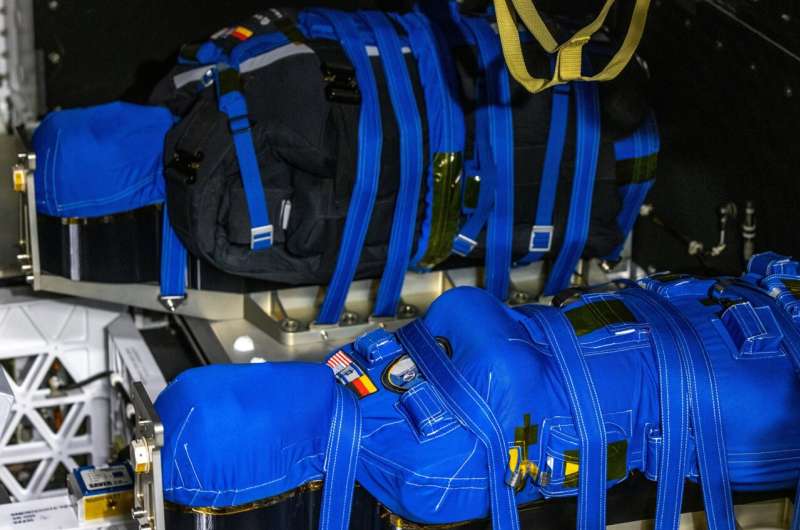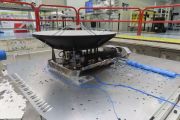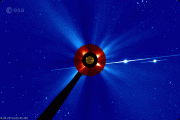
Copernical Team
Earth from Space: Fucino, Italy

Tucked away in the Fucino Valley, in central Italy, lies the Fucino Space Centre, where Telespazio will manage the early orbit activities of the Meteosat Third Generation Imager, set to launch on 13 December from Europe’s Spaceport in French Guiana.
Evaluating a Possible Drill Location
 The weekend drive went well and Curiosity is back on top of the marker band, investigating some intriguing rippled bedrock. We're assessing whether we want to drill at this location, based on what we see in the chemistry data.
So today's two-sol plan is devoted to collecting data from APXS and MAHLI (supplemented by ChemCam and Mastcam), to evaluate the bedrock in our workspace, as seen in
The weekend drive went well and Curiosity is back on top of the marker band, investigating some intriguing rippled bedrock. We're assessing whether we want to drill at this location, based on what we see in the chemistry data.
So today's two-sol plan is devoted to collecting data from APXS and MAHLI (supplemented by ChemCam and Mastcam), to evaluate the bedrock in our workspace, as seen in Phantoms return from beyond the Moon with valuable data on cosmic radiation doses
 Together with the Orion spacecraft of the Artemis I mission, as part of the MARE experiment, two human phantoms equipped with numerous cosmic rays detectors are to land on Earth. The information gathered by the detectors will for the first time verify the knowledge, crucial for the presence of humans in deep space, of the effects of cosmic rays on the health of the astronauts who are to live and
Together with the Orion spacecraft of the Artemis I mission, as part of the MARE experiment, two human phantoms equipped with numerous cosmic rays detectors are to land on Earth. The information gathered by the detectors will for the first time verify the knowledge, crucial for the presence of humans in deep space, of the effects of cosmic rays on the health of the astronauts who are to live and Colgate-Palmolive and NASA sign Space Act Agreement to boost off planet hygiene
 Colgate-Palmolive Company has signed an agreement with the National Aeronautics and Space Administration (NASA) to explore innovative solutions to advance oral health, personal care and skin health for both astronauts in space and people around the globe. Former astronaut Dr. Cady Coleman will work alongside Colgate as an advisor to help guide research design and offer insights into the realitie
Colgate-Palmolive Company has signed an agreement with the National Aeronautics and Space Administration (NASA) to explore innovative solutions to advance oral health, personal care and skin health for both astronauts in space and people around the globe. Former astronaut Dr. Cady Coleman will work alongside Colgate as an advisor to help guide research design and offer insights into the realitie NASA taps Collins Aerospace to develop new spacesuits for Space Station
 NASA has awarded a task order to Collins Aerospace to deliver a spacewalking system for potential use outside the International Space Station. This award - the second under NASA's Exploration EVA Services contract - is for design and development of a next-generation spacesuit and support systems. The task order has a base value of $97.2 million.
Collins Aerospace will complete a critical d
NASA has awarded a task order to Collins Aerospace to deliver a spacewalking system for potential use outside the International Space Station. This award - the second under NASA's Exploration EVA Services contract - is for design and development of a next-generation spacesuit and support systems. The task order has a base value of $97.2 million.
Collins Aerospace will complete a critical d Evolving time-tested technology to outmatch hypersonic weapons inside the atmosphere
 When it comes to defending against hypersonic weapons that move and maneuver at more than five times the speed of sound, you need layers of defense and multiple opportunities to take out the threat.
Seeking the first missile specifically designed to defeat hypersonic threats in their most vulnerable phase of flight, the glide phase, the MDA selected Raytheon Missiles and Defense, or RMD, a
When it comes to defending against hypersonic weapons that move and maneuver at more than five times the speed of sound, you need layers of defense and multiple opportunities to take out the threat.
Seeking the first missile specifically designed to defeat hypersonic threats in their most vulnerable phase of flight, the glide phase, the MDA selected Raytheon Missiles and Defense, or RMD, a These freeze-drying algae can awaken from cryostasis, could help spaceflights go farther
 Antarctica's McMurdo Dry Valleys contain some of Earth's coldest and driest deserts. The environment there is so extreme that the Dry Valleys have been used as Mars analogs to test prototype equipment for future Mars exploration. To survive these harsh conditions, layers of algae and bacteria in the Dry Valleys overwinter in a freeze-dried state, coming back to life in the summer when neighborin
Antarctica's McMurdo Dry Valleys contain some of Earth's coldest and driest deserts. The environment there is so extreme that the Dry Valleys have been used as Mars analogs to test prototype equipment for future Mars exploration. To survive these harsh conditions, layers of algae and bacteria in the Dry Valleys overwinter in a freeze-dried state, coming back to life in the summer when neighborin Japanese billionaire Maezawa announces crew of artists for lunar voyage
 Japanese billionaire Yusaku Maezawa announced Thursday eight crew members who will join him for a journey around the Moon planned for 2023 on a SpaceX rocket that is still under development.
The mission, known as dearMoon, was first announced in 2018. Maezawa initially said he would invite a crew of six-to-eight artists, but later changed the entry requirements to a competition which applica
Japanese billionaire Yusaku Maezawa announced Thursday eight crew members who will join him for a journey around the Moon planned for 2023 on a SpaceX rocket that is still under development.
The mission, known as dearMoon, was first announced in 2018. Maezawa initially said he would invite a crew of six-to-eight artists, but later changed the entry requirements to a competition which applica Artemis I landing spot abandoned over weather; mission remains on schedule
 Unsuitable weather is forcing NASA to abandon its primary landing site for the Orion spacecraft, although the mission otherwise remains on schedule, officials confirmed at a Thursday afternoon briefing.
"At present, we are on track to have a fully successful mission with some bonus objectives that we've achieved upon the way," Artemis I Mission Manager Mike Sarafin told reporters from J
Unsuitable weather is forcing NASA to abandon its primary landing site for the Orion spacecraft, although the mission otherwise remains on schedule, officials confirmed at a Thursday afternoon briefing.
"At present, we are on track to have a fully successful mission with some bonus objectives that we've achieved upon the way," Artemis I Mission Manager Mike Sarafin told reporters from J 'Phantoms' from beyond the moon could provide valuable data on cosmic radiation doses

The Orion spacecraft on the Artemis I mission is carrying, as part of the MARE experiment, two human "phantoms" equipped with numerous cosmic rays detectors. The information gathered by the detectors will for the first time verify the knowledge, crucial for the presence of humans in deep space, of the effects of cosmic rays on the health of the astronauts who are to live and work in an environment devoid of the protective effects of our planet's magnetosphere.
Of the numerous dangers lurking for astronauts undertaking long-distance space travel, among the most serious and at the same time the most difficult to eliminate, is exposure to harmful doses of cosmic radiation. Data collected during the MARE experiment (MATROSHKA AstroRad Radiation Experiment) will help ensure the safety of future deep space pioneers.




































